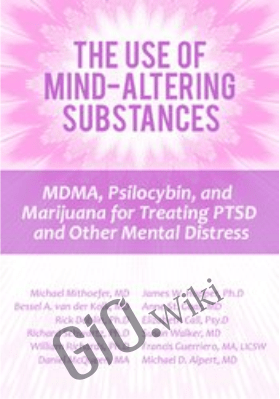Michael Mithoefer, Bessel Van der Kolk , Richard C. Schwartz , Rick Doblin , William Richards , Daniel McQueen , James W. Hopper , Anne St. Goar , Elizabeth Call , Susan Walker , Francis Guerriero & Michael Alpert
About Author
Michael Mithoefer, MD, clinical assistant professor of psychiatry at the Medical University of South Carolina. In 2009, he completed & published the first FDA approved clinical trial of MDMA assisted psychotherapy for treatment-resistant PTSD, followed by completion of a Phase II trial. He is overseeing a multisite Phase III study of MDMA-assisted psychotherapy in 13 sites around the US (including the Trauma Research Foundation), and another MDMA-assisted psychotherapy multisite study in Europe and Israel.
Speaker Disclosures:
Financial: Michael Mithoefer receives a salary and grants from MAPS Public Benefit Corp and is a clinical assistant professor at the Medical University of South Carolina.
Non-financial: Michael Mithoefer is a member of the non-profit MAPS.
Bessel A. Van der Kolk, M.D., is a clinician, researcher and teacher in the area of post-traumatic stress. His work integrates developmental, neurobiological, psychodynamic and interpersonal aspects of the impact of trauma and its treatment.
Dr. van der Kolk and his various collaborators have published extensively on the impact of trauma on development, such as dissociative problems, borderline personality and self-mutilation, cognitive development, memory, and the psychobiology of trauma. He has published over 150 peer reviewed scientific articles on such diverse topics as neuroimaging, self-injury, memory, neurofeedback, Developmental Trauma, yoga, theater and EMDR.
He is founder and medical director of the Trauma Center in Brookline, Massachusetts. The Trauma Center consists of a well-trained clinical team specializing in the treatment of children and adults with histories of child maltreatment, that applies treatment models that are widely taught and implemented nationwide. He also created the Trauma Research Foundation, the non-profit arm of the Trauma Center, that is organized to promote clinical, scientific and educational projects.
His most recent 2014 New York Times best seller, The Body Keeps the Score: Brain, Mind, and Body in the Treatment of Trauma, transforms our understanding of traumatic stress, revealing how it literally rearranges the brain’s wiring – specifically areas dedicated to pleasure, engagement, control, and trust. He shows how these areas can be reactivated through innovative treatments including neurofeedback, somatically based therapies, EMDR, psychodrama, play, yoga, and other therapies.
Dr. van der Kolk is the past president of the International Society for Traumatic Stress Studies, and professor of psychiatry at Boston University Medical School. He regularly teaches at conferences, universities, and hospitals around the world.
Speaker Disclosures:
Financial: Bessel van der Kolk is a professor of psychiatry at the Boston University School of Medicine. He receives a speaking honorarium from PESI, Inc.
Nonfinancial: Bessel van der Kolk has no relevant nonfinancial relationship to disclose.
Richard Schwartz, Ph.D., earned his Ph.D. in marriage and family therapy from Purdue University, after which he began a long association with the Institute for Juvenile Research at the University of Illinois at Chicago, and more recently at The Family Institute at Northwestern University, attaining the status of associate professor at both institutions. He is co-author, with Michael Nichols, of Family Therapy: Concepts and Methods, the most widely used family therapy text in the United States.
Dr. Schwartz developed Internal Family Systems in response to clients’ descriptions of experiencing various parts – many extreme – within themselves. He noticed that when these parts felt safe and had their concerns addressed, they were less disruptive and would accede to the wise leadership of what Dr. Schwartz came to call the “Self.” In developing IFS, he recognized that, as in systemic family theory, parts take on characteristic roles that help define the inner world of the clients. The coordinating Self, which embodies qualities of confidence, openness, and compassion, acts as a center around which the various parts constellate. Because IFS locates the source of healing within the client, the therapist is freed to focus on guiding the client’s access to his or her true Self and supporting the client in harnessing its wisdom. This approach makes IFS a non-pathologizing, hopeful framework within which to practice psychotherapy. It provides an alternative understanding of psychic functioning and healing that allows for innovative techniques in relieving clients symptoms and suffering.
In 2000, Richard Schwartz founded The Center for Self Leadership in Oak Park, Illinois. Dr. Schwartz is a featured speaker for many national psychotherapy organizations and a fellow of the American Association for Marriage and Family Therapy, and he serves on the editorial boards of four professional journals. He has published four books and over 50 articles about IFS. His books include Internal Family Systems Skills Training Manual (with Frank Anderson, M.D. and Martha Sweezy, Ph.D) (PESI, 2017), Internal Family Systems Therapy (Guilford Press, 1997), Introduction to the Internal Family Systems Model (Tarcher, 2001), and The Mosaic Mind (with Regina Goulding) (Trailheads, 2003), as well as Metaframeworks(with Doug Breunlin and Betty Karrer) (Jossey-Bass, 1997). Dr. Schwartz lives and practices in Brookline, MA and is on the faculty of the Department of Psychiatry, Harvard School of Medicine.
Rick Doblin, Ph.D., Executive Director, Multidisciplinary Association for Psychedelic Studies (MAPS); chair of the board of directors MAPS Public Benefit Corporation.
William Richards, Ph.D., Psychologist, Johns Hopkins Bayview Medical Center where he is co-director of the program in psilocybin for terminally ill cancer patients. Contributor Fantastic Fungi.
Daniel McQueen, MA, Psychedelic therapist and executive director of Medicinal Mindfulness. Author of Cannabis-Assisted Psychedelic Therapy for Trauma Resolution.
James W. Hopper, Ph.D., Independent consultant and instructor in psychology, Cambridge Health Alliance & Harvard Medical School. Co-editor, Mindfulness-oriented interventions for trauma: Integrating contemplative practices. The MDMA Team, Trauma Research Foundation.
Anne St. Goar, MD, Primary care physician at HVMA, emeritus certified psychedelic therapist; Boston MDMA Therapy team member with the Trauma Research Foundation.
Elizabeth Call, Psy.D., Psychologist in private practice. Therapy team member, MDMA study, the Trauma Research Foundation.
Susan Walker, MD, Instructor in psychiatry, Harvard Medical School. Child and Adolescent Psychiatrist, Cambridge Health Alliance. MDMA Therapy Team Member, the Trauma Research Foundation.
Francis Guerriero, MA, LICSW, Private practice, Cambridge, MA; MDMA Therapy team member, The Trauma Research Foundation.
Michael D. Alpert, MD, Psychiatrist, South Cove Community Health Center, Boston Harvard Medical School; MDMA Therapy team member, the Trauma Research Foundation.

![© GiO Wiki - Courses [BigData]](/assets/img/user_mobile.png)

